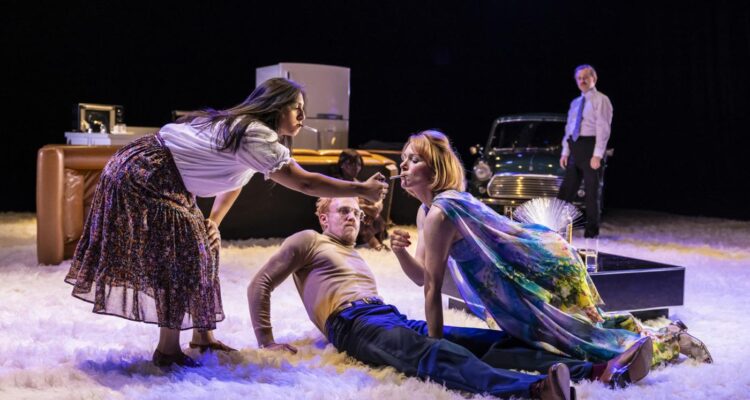Is Abigail’s Party the Macbeth of twentieth century theatre? Yes, they both feature a dinner party you want to escape from, but I mean that barely a week goes by without Mike Leigh’s seminal play being performed in amateur and professional groups throughout the country. Much of the reason for its popularity is due to the entrenched memory of the 1977 TV production, (seen by a huge audience as ITV was on strike), searing Alison Steadman’s career defining performance as Beverly on the nation’s consciousness. Whereas Shakespeare’s anti-hero can be reinterpreted multiple times, Abigail’s Party is preserved in 1977 aspic, the danger being that any new interpretations will take away from the original, and to perform it as originally presented risks the show being stale.
Unfortunately, Jack Bradfield’s production falls between the two stools. Some of the attitudes of the time are shocking, and the structure isn’t played about with too much. But, like Anna Yates’s open plan design, which indicates locations beyond the living room, the claustrophobia of the hellish dinner party is taken away. The mini car on stage is a major distraction, when Lawerence sits on the bonnet how can he be heard in the living room if he is in the garage? A slow first half gives way to a frenetic second act that hammers out any nuances of the text and takes no time to linger on the darkness of the comedy.
Social aspiration is placed central, which may explain why Laura Rogers’s Beverly is Welsh, (though the accent travels), and Joe Blakemore’s Tony is Geordie, with racial diversity being shown by Chaya Gupta as Angela and Amy Rockson as Susan. This is to reflect the growing ambition of the middle class, and throws up some interesting conundrums. However, none of the characterisation is pushed enough, although Beverly is a bully, she’s not the monster she could be, and the coercive control element to Tony and Angela’s marriage is rushed over. The biggest issue, for me, is Leander Deeny’s performance of Lawrence, feeling as if it belongs in another production, (possibly Fawlty Towers), and the over-the-top slapstick humour sits very uneasily with the dark comedy. I think the directorial approach is to show how childish adults can be when drunk, but all the screaming and shouting means that Lawrence’s heart attack and subsequent tragedy feels unearned.
Frustratingly, the music is out of kilter. Although Demis Roussous was only ever played in the TV production, Forever and Forever is missed, and Adam Ant was a few years after 1977! Although Beverly’s “dance of death” is interesting, it makes her very unsympathetic, as are all the characters. Although there is much to enjoy, the production needs to take a deep breath and let the show breathe in places where it needs to.
Written by Mike Leigh.
Directed by Jack Bradfield.
Cast: Joe Blackmore, Leander Deeny, Chaya Gupta, Amy Rockson, Laura Rogers.
Running time: 2 hours 5 minutes with an interval.
Until 12 October 2014

